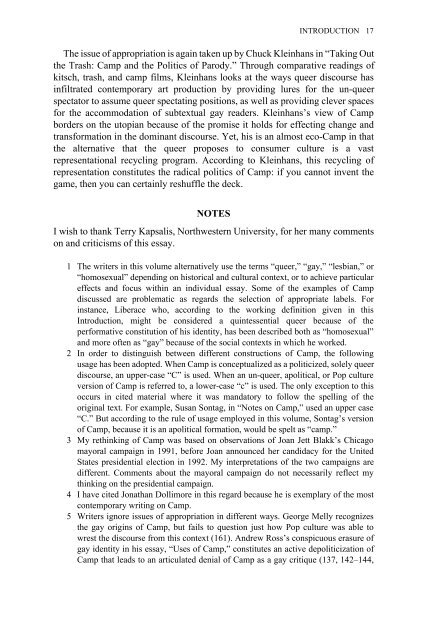Edited by Moe Meyer - Get a Free Blog
Edited by Moe Meyer - Get a Free Blog
Edited by Moe Meyer - Get a Free Blog
You also want an ePaper? Increase the reach of your titles
YUMPU automatically turns print PDFs into web optimized ePapers that Google loves.
The issue of appropriation is again taken up <strong>by</strong> Chuck Kleinhans in “Taking Out<br />
the Trash: Camp and the Politics of Parody.” Through comparative readings of<br />
kitsch, trash, and camp films, Kleinhans looks at the ways queer discourse has<br />
infiltrated contemporary art production <strong>by</strong> providing lures for the un-queer<br />
spectator to assume queer spectating positions, as well as providing clever spaces<br />
for the accommodation of subtextual gay readers. Kleinhans’s view of Camp<br />
borders on the utopian because of the promise it holds for effecting change and<br />
transformation in the dominant discourse. Yet, his is an almost eco-Camp in that<br />
the alternative that the queer proposes to consumer culture is a vast<br />
representational recycling program. According to Kleinhans, this recycling of<br />
representation constitutes the radical politics of Camp: if you cannot invent the<br />
game, then you can certainly reshuffle the deck.<br />
NOTES<br />
INTRODUCTION 17<br />
I wish to thank Terry Kapsalis, Northwestern University, for her many comments<br />
on and criticisms of this essay.<br />
1 The writers in this volume alternatively use the terms “queer,” “gay,” “lesbian,” or<br />
“homosexual” depending on historical and cultural context, or to achieve particular<br />
effects and focus within an individual essay. Some of the examples of Camp<br />
discussed are problematic as regards the selection of appropriate labels. For<br />
instance, Liberace who, according to the working definition given in this<br />
Introduction, might be considered a quintessential queer because of the<br />
performative constitution of his identity, has been described both as “homosexual”<br />
and more often as “gay” because of the social contexts in which he worked.<br />
2 In order to distinguish between different constructions of Camp, the following<br />
usage has been adopted. When Camp is conceptualized as a politicized, solely queer<br />
discourse, an upper-case “C” is used. When an un-queer, apolitical, or Pop culture<br />
version of Camp is referred to, a lower-case “c” is used. The only exception to this<br />
occurs in cited material where it was mandatory to follow the spelling of the<br />
original text. For example, Susan Sontag, in “Notes on Camp,” used an upper case<br />
“C.” But according to the rule of usage employed in this volume, Sontag’s version<br />
of Camp, because it is an apolitical formation, would be spelt as “camp.”<br />
3 My rethinking of Camp was based on observations of Joan Jett Blakk’s Chicago<br />
mayoral campaign in 1991, before Joan announced her candidacy for the United<br />
States presidential election in 1992. My interpretations of the two campaigns are<br />
different. Comments about the mayoral campaign do not necessarily reflect my<br />
thinking on the presidential campaign.<br />
4 I have cited Jonathan Dollimore in this regard because he is exemplary of the most<br />
contemporary writing on Camp.<br />
5 Writers ignore issues of appropriation in different ways. George Melly recognizes<br />
the gay origins of Camp, but fails to question just how Pop culture was able to<br />
wrest the discourse from this context (161). Andrew Ross’s conspicuous erasure of<br />
gay identity in his essay, “Uses of Camp,” constitutes an active depoliticization of<br />
Camp that leads to an articulated denial of Camp as a gay critique (137, 142–144,


